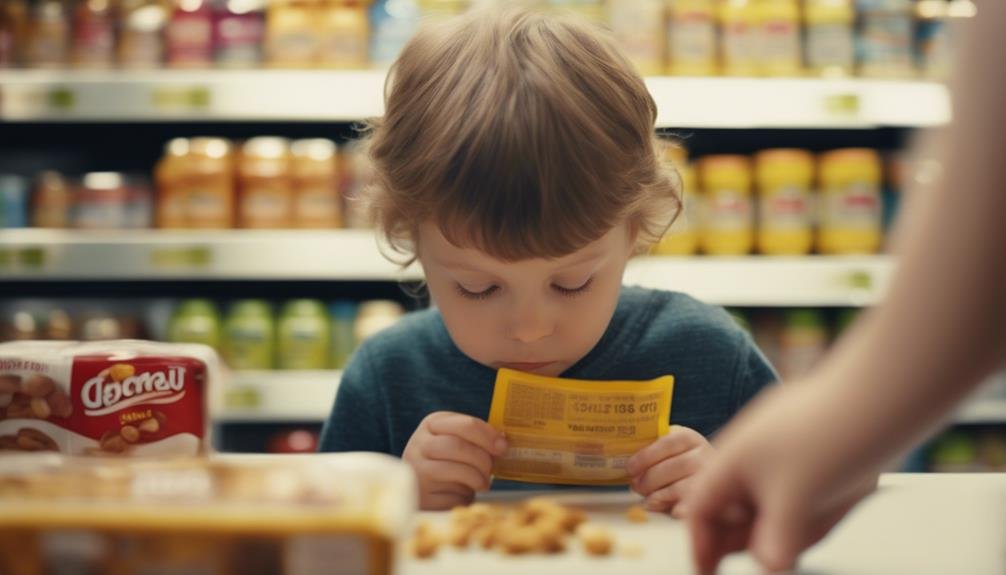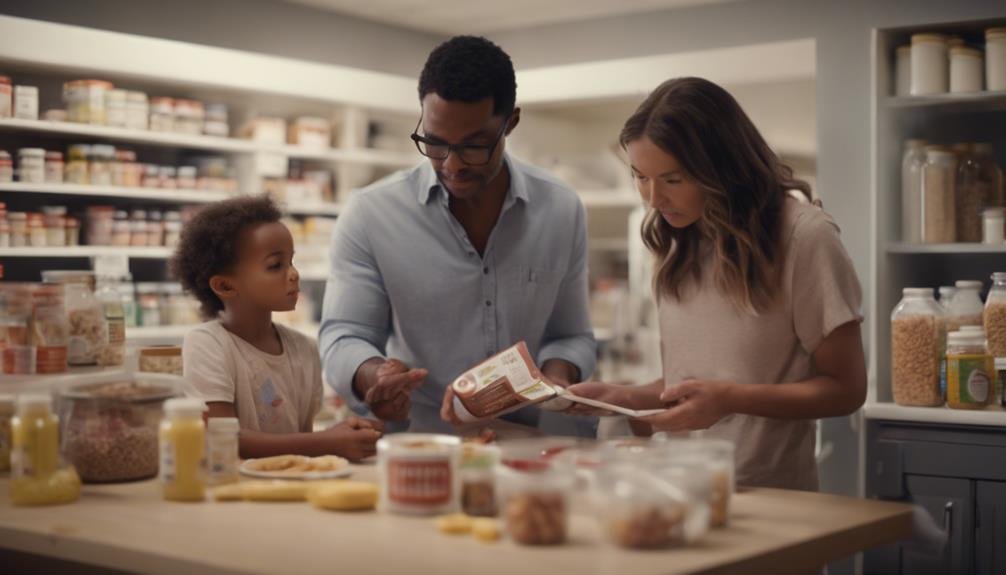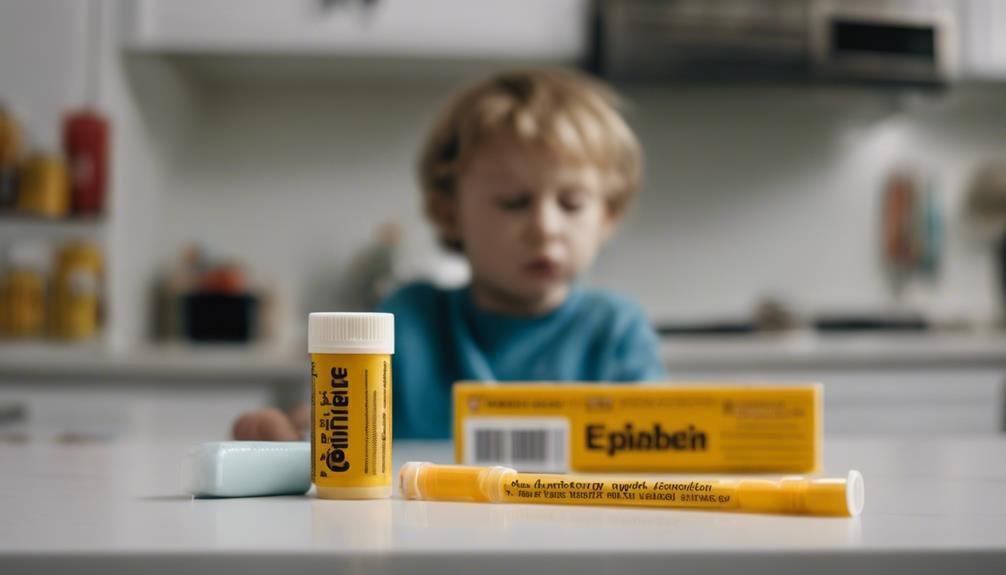Handling Food Allergies in Toddlers: A Comprehensive Guide
As a parent, navigating food allergies in toddlers can be a daunting task. You strive to keep your little one safe and healthy, but the complexities of managing allergens may leave you feeling overwhelmed. However, with the right knowledge and tools at your disposal, you can confidently navigate this challenging terrain. By understanding the nuances of toddler food allergies and implementing expert strategies, you can create a safe environment for your child to thrive. But how exactly can you ensure you're taking the best approach?
Key Takeaways
- Consult a healthcare provider for confirmation of toddler's food allergy.
- Keep a detailed food diary to track reactions and identify allergens.
- Eliminate the allergen from the toddler's diet and have an emergency plan.
- Consult with a pediatric allergist for personalized management and guidance.
- Educate caregivers on allergen avoidance, symptoms, and emergency response.
Understanding Toddler Food Allergies

If your toddler experiences sudden adverse reactions after eating certain foods, it's essential to understand the basics of toddler food allergies. These reactions can range from mild symptoms like hives or an upset stomach to severe ones such as difficulty breathing or even anaphylaxis. It's a scary experience for both you and your little one, but knowing how to navigate through it's crucial.
Firstly, it's important to consult with a healthcare provider to confirm if your child has a food allergy. They might recommend keeping a food diary to track what your toddler eats and any reactions that occur. This can help identify the specific food causing the allergy. Once you have pinpointed the allergen, the next step is to eliminate it from your child's diet completely.
Being vigilant about reading food labels, informing caregivers about the allergy, and having an emergency action plan in place are all vital components of managing toddler food allergies. Remember, you're not alone in this journey, and with the right information and support, you can help your toddler thrive despite their allergies.
Common Food Allergens in Toddlers
Navigating through toddler food allergies involves being aware of the common food allergens that can trigger reactions in your little one. Some of the most prevalent allergens in toddlers include cow's milk, eggs, peanuts, tree nuts (such as almonds, cashews, and walnuts), soy, wheat, fish, and shellfish. These foods can cause mild to severe allergic reactions, ranging from hives and itching to more serious symptoms like difficulty breathing and anaphylaxis. As a parent, it's crucial to carefully read food labels and be cautious when introducing new foods to your toddler's diet. Remember, even a small amount of the allergen can lead to a reaction, so it's essential to be vigilant.
It's also important to note that food allergies can vary from child to child, so what triggers a reaction in one toddler may not affect another. If you suspect your child has an allergy to a specific food, consult with a pediatrician or allergist to determine the best course of action. By being informed about common food allergens and taking proactive measures, you can help keep your toddler safe and healthy.
Identifying Food Allergy Symptoms

To recognize food allergy symptoms in toddlers, pay close attention to any unusual reactions after eating certain foods. Symptoms can vary from mild to severe and may include hives, itching, swelling, eczema flare-ups, vomiting, diarrhea, or even difficulty breathing. These signs typically occur shortly after consuming the allergen, making it easier to pinpoint the trigger food.
Sometimes, food allergies may manifest as behavioral changes in toddlers, such as irritability, restlessness, or difficulty sleeping. It's essential to observe these subtler cues as they could indicate an underlying food allergy.
If you notice your toddler experiencing recurrent symptoms after eating a specific food, keep a detailed food diary to track their reactions. This record can provide valuable information to healthcare professionals when diagnosing food allergies.
Consulting With Pediatric Allergists
When seeking guidance on managing your toddler's food allergies, scheduling a consultation with a pediatric allergist is a crucial step towards understanding and addressing their specific needs. Pediatric allergists specialize in diagnosing and treating food allergies in young children, providing you with expert guidance on how to navigate this challenging journey. During the consultation, the allergist will conduct a thorough evaluation, which may include skin prick tests, blood tests, and a detailed medical history review to accurately identify your toddler's allergens.
Furthermore, the allergist will work with you to create a personalized management plan tailored to your toddler's unique requirements. This plan may involve dietary restrictions, emergency action plans, and guidance on how to recognize and respond to allergic reactions. Consulting with a pediatric allergist can offer you peace of mind, knowing that you have a knowledgeable partner in managing your toddler's food allergies. Remember, you aren't alone in this; the allergist is there to support you every step of the way.
Reading Food Labels for Allergens

For parents of toddlers with food allergies, understanding how to read food labels for allergens is essential for ensuring your child's safety and well-being. When navigating the aisles of the grocery store, here are some key points to keep in mind:
- Ingredients List: Always check the ingredients list for common allergens such as peanuts, tree nuts, milk, eggs, soy, wheat, fish, and shellfish.
- Allergen Warnings: Look out for allergen warnings like 'Contains: [allergen]' or 'May contain traces of [allergen]' to identify potential risks.
- Cross-Contamination: Be aware of statements about cross-contamination with allergens, as even small amounts can trigger a reaction in sensitive individuals.
- Certifications: Consider products with allergy-specific certifications like the FARE (Food Allergy Research & Education) label, which indicates that the product has been vetted for allergen safety.
Strategies for Allergen-Free Meals
Navigating the challenge of preparing allergen-free meals for your toddler can be made simpler with some practical strategies in place. When planning meals, opt for whole foods like fruits, vegetables, lean proteins, and grains that are naturally free of common allergens. Be diligent about reading labels, even on products you've used before, as ingredients can change. Cross-contamination is a real concern, so ensure all utensils, cutting boards, and cooking surfaces are thoroughly cleaned before use. Consider dedicating specific kitchen tools for allergen-free cooking.
Batch cooking can be a lifesaver. Prepare large portions of safe meals and freeze them in individual servings for quick and easy meals on busy days. Get creative with ingredient substitutions. There are many allergy-friendly alternatives available, such as dairy-free milk, egg replacers, and gluten-free flours. Finally, communicate openly with caregivers and family members about your toddler's allergies and the importance of following the meal plan you've established. These strategies can help you navigate allergen-free meal preparation with confidence and ease.
Educating Caregivers and Family Members

To ensure the safety and well-being of your toddler with food allergies, it's crucial to educate caregivers and family members about their specific allergens and the necessary precautions to prevent exposure.
Here are some essential steps to consider:
- Label Reading: Teach caregivers and family members how to read food labels carefully to identify potential allergens.
- Cross-Contamination Awareness: Emphasize the importance of avoiding cross-contamination during meal preparation to prevent accidental exposure.
- Symptom Recognition: Educate them on the signs and symptoms of an allergic reaction, ensuring they can act promptly if a reaction occurs.
- Emergency Response Plan: Develop and share an emergency response plan detailing steps to take in case of an allergic reaction, including administering medication and seeking medical help.
Managing Food Allergies in Social Settings
In social settings, being proactive about your toddler's food allergies can help create a safe and inclusive environment for everyone involved. When attending social gatherings or events, it's essential to communicate clearly with the hosts about your child's allergies. Politely but firmly remind them of what your toddler can and can't eat. Offering to bring safe snacks for your little one can also ease any concerns and ensure there are suitable options available.
Educating close friends and family members who may be present at these social gatherings is equally crucial. Encourage them to be vigilant about cross-contamination and to understand the severity of your child's allergies. Suggest simple ways they can help, such as washing their hands before handling food or keeping allergen-free treats on hand.
During the event, keep a close eye on your toddler and be ready to intervene if necessary. Don't hesitate to ask about ingredients in dishes or to politely decline foods if you're unsure. By taking these proactive steps, you can help make social settings more accommodating for your toddler's food allergies.
Emergency Preparedness and Action Plans

Prepare for unexpected situations by developing an emergency action plan tailored to your toddler's specific food allergies. It's crucial to be ready for any scenario that may arise. Here are some key steps to include in your emergency preparedness plan:
- Always Carry Medications: Ensure you have your toddler's prescribed medications like epinephrine auto-injectors readily available at all times.
- Educate Caregivers: Make sure that anyone taking care of your toddler understands the seriousness of their food allergies and knows how to respond in an emergency.
- Create Allergy Cards: Develop allergy information cards detailing your toddler's allergies, symptoms of a reaction, and emergency contact numbers to give to caregivers, schools, and restaurants.
- Practice Emergency Drills: Regularly rehearse how to administer medications and seek help in case of an allergic reaction to be prepared and efficient during a real emergency.
Frequently Asked Questions
Can Food Allergies in Toddlers Develop Into Other Allergies Over Time?
Yes, food allergies in toddlers can evolve into other allergies as they grow. It's essential to monitor symptoms, consult an allergist, and adjust their diet. Stay informed, stay vigilant, and seek professional guidance for proper management.
How Can I Help My Toddler Cope With the Emotional Impact of Food Allergies?
Feeling overwhelmed by your toddler's food allergies? Start by creating a safe environment at home. Communicate openly, educate family and friends, empower your child with knowledge, and seek support from healthcare providers and support groups.
Are There Any Alternative Therapies or Treatments for Toddler Food Allergies?
When dealing with toddler food allergies, explore alternative therapies cautiously. Consult with healthcare providers. Options like acupuncture, probiotics, and herbal remedies might be considered, but always prioritize safety and effectiveness. Your child's well-being matters most.
What Should I Do if My Toddler Has an Allergic Reaction While Traveling?
If your toddler has an allergic reaction while traveling, act swiftly. Administer medication if available, call emergency services, and seek medical help. Remember, prompt action can be life-saving. Always carry allergy medications and an action plan.
How Can I Ensure My Toddler Receives Proper Nutrition on an Allergen-Free Diet?
To ensure your toddler gets proper nutrition on an allergen-free diet, focus on whole foods like fruits, veggies, proteins, and grains. Consult a pediatrician or dietitian for guidance, and read food labels diligently to avoid allergens.
Conclusion
As you navigate the world of toddler food allergies, remember that knowledge is your greatest tool. By understanding common allergens, identifying symptoms, and working closely with healthcare professionals, you can confidently manage your child's dietary needs.
Stay vigilant, educate those around you, and always be prepared for emergencies. With dedication and care, you can create a safe and allergen-free environment for your toddler to thrive.
Remember, knowledge is power in keeping your little one safe and healthy.




